外研版英语八年级上册MModule 12 Help Unit 3 Language in use . 课件(共38张ppt)
文档属性
| 名称 | 外研版英语八年级上册MModule 12 Help Unit 3 Language in use . 课件(共38张ppt) |  | |
| 格式 | zip | ||
| 文件大小 | 3.1MB | ||
| 资源类型 | 教案 | ||
| 版本资源 | 外研版 | ||
| 科目 | 英语 | ||
| 更新时间 | 2020-08-08 16:51:16 | ||
图片预览

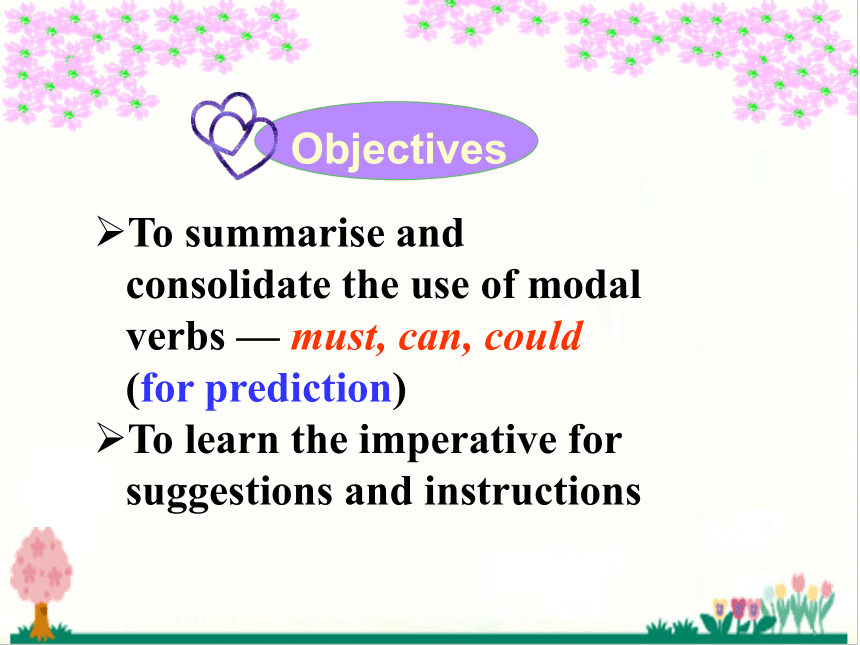
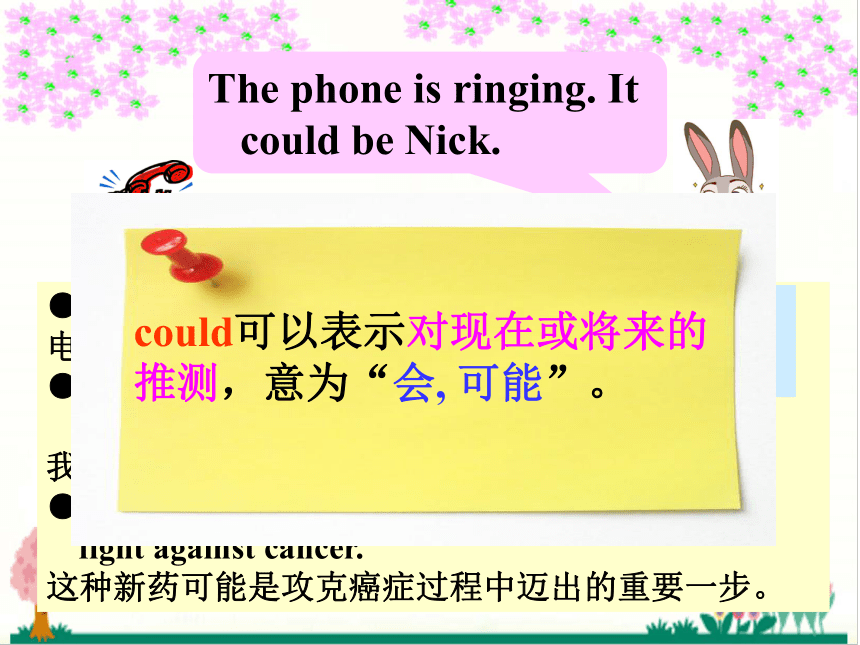


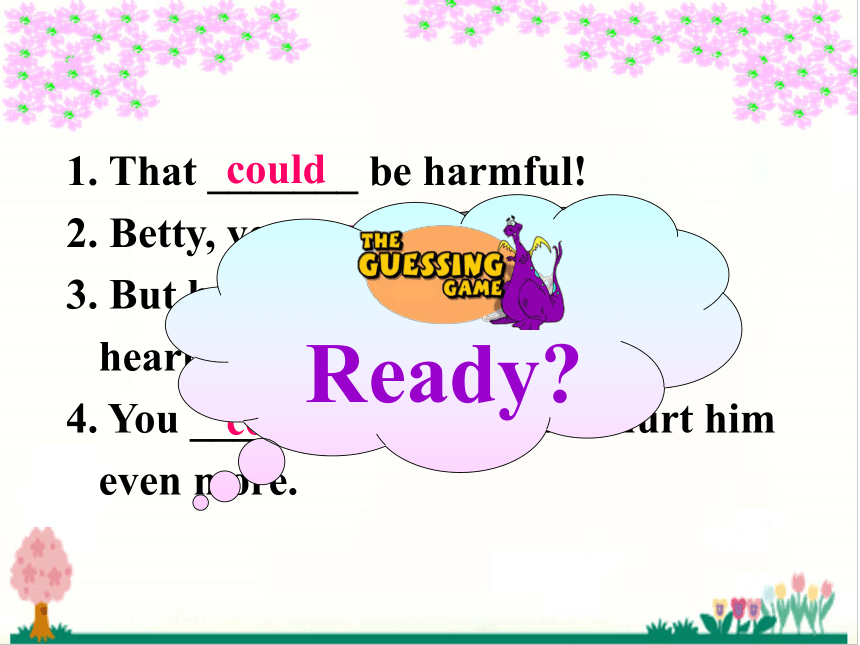
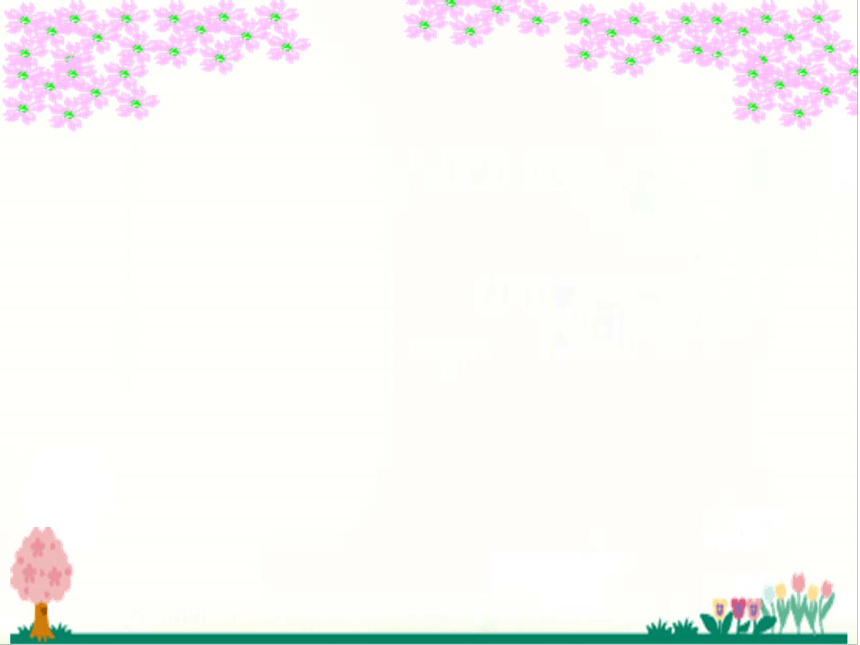

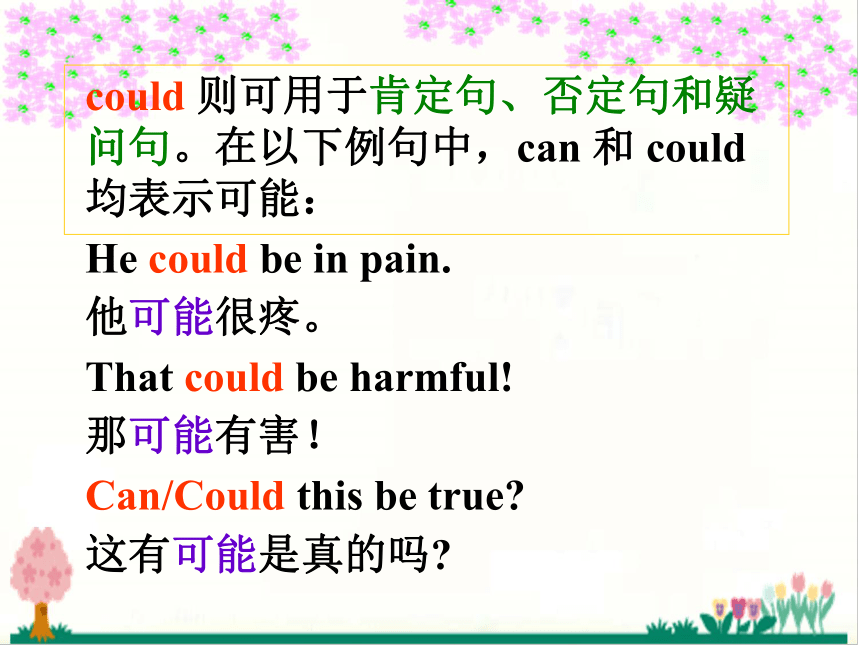
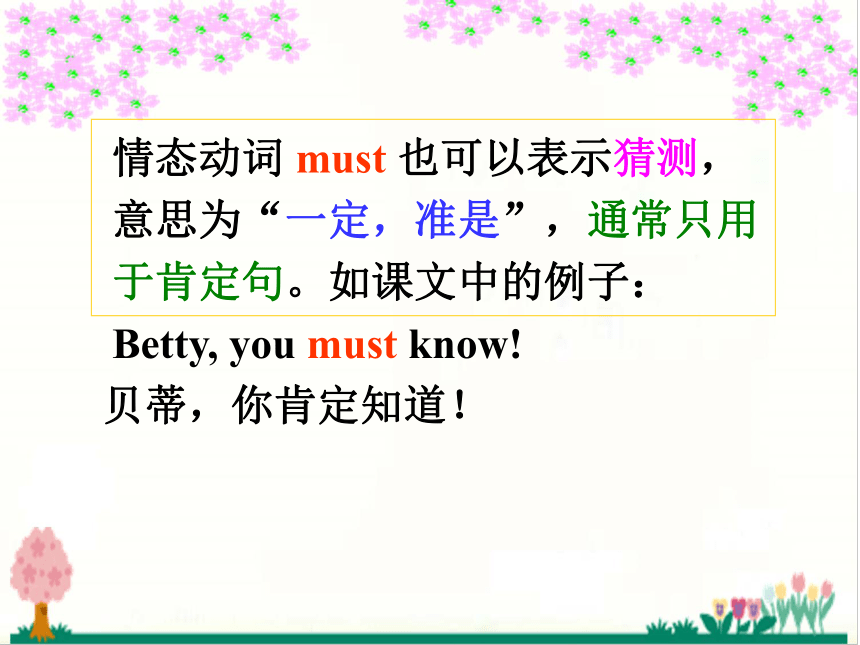
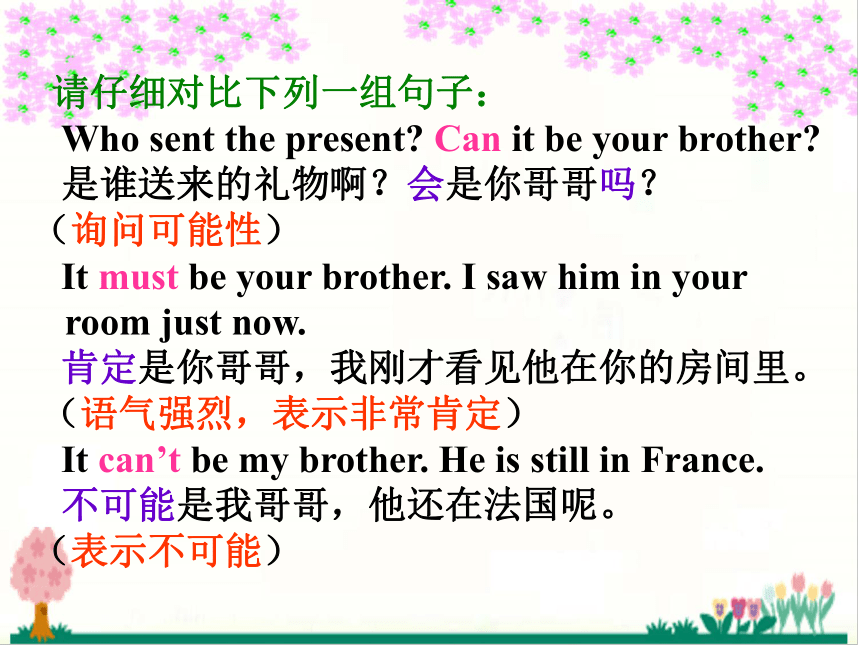

文档简介
(共38张PPT)
Unit
3
Language
in
use
To
summarise
and
consolidate
the
use
of
modal
verbs
—
must,
can,
could
(for
prediction)
To
learn
the
imperative
for
suggestions
and
instructions
●The
phone
is
ringing.
It
could
be
Nick.
电话响了,可能是尼克打来的。
●I
don’t
know
when
they’ll
be
here.
They
could
arrive
at
any
time.
我不知道他们多会来,他们可能随时会来。
●
This
new
drug
could
be
an
important
step
in
the
fight
against
cancer.
这种新药可能是攻克癌症过程中迈出的重要一步。
Read
the
conversations
and
pay
attention
to
the
circled
parts.
1.
That
could
be
harmful!
2.
Betty,
you
must
know!
3.
But
he
could
have
trouble
hearing
you
or
speaking
to
you.
4.
You
could
drop
him
and
hurt
him
even
more.
Observe
Observe
the
following
sentences
carefully
and
pay
attention
to
the
words
in
red.
1.
That
_______
be
harmful!
2.
Betty,
you
_______
know!
3.
But
he
________
have
trouble
hearing
you
or
speaking
to
you.
4.
You
_______
drop
him
and
hurt
him
even
more.
could
must
could
go
could
Ready?
情态动词must,can,
could表推测
情态动词?must/can/could?表示推测
我们学习过情态动词
can
和
could
表示“能够,可以”等意义的用法。can
和
could
还可以表示对现在或将来的推测,意为“会,
可能”,但
can
表示推测时,往往用于否定句和疑问句。用于疑问句时,can
比
could
表示的“可能性”要大;用于否定句时,cannot
(can’t)表示“不可能”。例如:
He
can’t
be
at
home.?
他不可能在家。
could
则可用于肯定句、否定句和疑问句。在以下例句中,can
和
could
均表示可能:
He
could
be
in
pain.?
他可能很疼。
That
could
be
harmful!?
那可能有害!
Can/Could
this
be
true??
这有可能是真的吗?
情态动词
must
也可以表示猜测,意思为“一定,准是”,通常只用于肯定句。如课文中的例子:
Betty,
you
must
know!?
贝蒂,你肯定知道!
请仔细对比下列一组句子:
Who
sent
the
present?
Can
it
be
your
brother??
是谁送来的礼物啊?会是你哥哥吗?
(询问可能性)
It
must
be
your
brother.
I
saw
him
in
your
room
just
now.?
肯定是你哥哥,我刚才看见他在你的房间里。
(语气强烈,表示非常肯定)
It
can’t
be
my
brother.
He
is
still
in
France.?
不可能是我哥哥,他还在法国呢。
(表示不可能)
祈使句
1.
Hide
under
a
table.
Stay
away
from
windows
and
heavy
furniture.
Keep
Clear
of
fires.
2.
Leave
the
buildings
quickly
…
3.
Keep
calm,
…
Be
brave
and
be
helpful.
4.
Move
away
from
buildings,
…
5.
Stay
away
from
bridges
and
trees.
6.
In
the
mountains,
be
careful
of
falling
rocks.
7.
On
a
beach,
run
away
from
the
sea
and
move
quickly
to
higher
ground.
What
shall
we
do
or
not
do
if
an
earthquake
happens?
Revision
1.
Don’t
jump
out
of
high
buildings.
2.
Don’t
stand
near
street
lights
or
under
power
lines.
1.
Stay
away
from
windows
and
heavy
furniture.
2.
Do
not
stand
near
street
lights
or
under
power
lines.
3.
Make
sure
he’s
warm.
Cover
him
with
a
coat.
4.
Find
out
what’s
wrong
with
him.
5.
Do
not
jump
out
of
high
buildings.
6.
On
a
beach,
run
away
from
the
sea
and
move
quickly
to
higher
ground.
Observe
Observe
the
following
sentences
carefully
and
pay
attention
to
the
words
in
red.
1.
_______
_______
_______
(stay)
windows
and
heavy
furniture.
2.
_______
_______
(stand)
near
street
lights
or
under
power
lines.
3.
_______
______
(make
sure)
he’s
warm.
_______
him
with
a
coat.
4.
_______
_____
(find)
what’s
wrong
with
him.
5.
______
______
______
______
_____
(not
jump)
high
buildings.
6.
On
a
beach,
_____
______
______
(run)
the
sea
and
______
(move)
quickly
to
higher
ground.
Make
sure
Find
out
Do
not
jump
out
of
run
away
from
move
Cover
Stay
away
from
Don’t
stand
go
Ready?
祈使句表达说话人对对方的叮嘱、劝告、希望、禁止、建议、请求或命令等。祈使句一般以动词原形开头,无时态和数的变化。常见的祈使句如下:
1.动词原形构成的祈使句
2.let’s构成的祈使句
3.无动词祈使句
1.
动词原形构成的祈使句
此类祈使句暗含的主语是you,但通常省略。否定句往往由
do
not(don’t)或
never
开头。
Have
a
nice
day!?
祝你度过美好的一天!
Don’t
waste
your
time!?
别浪费时间了!
Never
be
late
again!?
再也不要迟到了!
Come
this
way,
please.?
请走这边。
Please
be
quiet,
boys!?
男孩们,请安静!
祈使句的句首或句末有时加
please,还可以加上称呼语,用逗号与句子主体隔开。
2.
let’s构成的祈使句
这类祈使句往往用于提出建议。
Let’s
spend
this
weekend
in
the
countryside.?
这周咱们到乡下度周末吧。
Let’s
take
a
taxi,
shall
we??
我们坐出租车好吗?
3.
无动词祈使句
在请求、命令和口号中,常用无动词祈使句,它实际上是省略了动词,从而使语句更简洁有力。
Just
a
minute,
please!?
请稍等!
This
way,
please!?
请这边走!
1
It
is
dangerous.
You
_____
keep
out!
2
These
stairs
are
not
safe.
You
______
use
them.
3
The
rocks
are
falling
down.
You
______
get
hit.
4
The
river
is
too
deep.
You
_______
swim
in
it.
5
Betty
_____
know
what
to
do
because
she
did
some
basic
medical
training.
must
mustn’t
Complete
the
sentences
with
could,
must
or
mustn’t.
1
P100
could
mustn’t
must
Underline
the
correct
words
to
complete
the
first
aid
instructions.
1
Get
/
Do
not
get
medical
help
immediately.
2
Ask
/
Do
not
ask
them
where
the
pain
is.
3
Lift
/
Do
not
lift
them
because
you
may
drop
them.
4
Keep
/
Do
not
keep
them
warm.
2
P100
When
there
is
an
earthquake
...
1
_________
from
the
windows.
2
__________
a
table.
3
__________
the
lift.
4
______
the
building
quickly
when
the
ground
stops
shaking.
5
_____
calm.
Stay
away
Hide
under
Do
not
use
Leave
Keep
do
not
use
hide
under
keep
leave
stay
away
Complete
the
poster
about
earthquakes
with
the
correct
form
of
the
words
and
expressions
in
the
box.
3
P100
Tony:
Daming
is
training
hard
for
the
big
match.
Lingling:
Yes,
the
team
has
a
good
(1)________
this
year.
Tony:
Oh
no,
Daming’s
(2)_________.
He’s
down!
Lingling:
It
looks
like
he’s
(3)________.
Tony:
Daming,
what
happened?
Daming:
It’s
my
leg.
Lingling:
(4)
_______
him
with
my
coat.
Tony:
But
don’t
move
him.
Let’s
wait
for
someone
with
(5)
________
training.
Lingling:
OK.
chance
in
trouble
in
pain
chance
Cover
in
pain
in
trouble
medical
Cover
medical
Complete
the
conversation
with
the
words
and
expressions
in
the
box.
4
P101
Information
is
coming
in
that
there
could
be
(1)
________
because
of
heavy
rain
in
the
north.
The
government
is
(2)
________
people
about
falling
(3)
_______.
Some
roads
have
a
lot
of
rocks
on
them,
but
people
are
trying
to
(4)
________
them
quickly.
In
some
places
there
is
no
(5)
_______.
And
people
must
stay
(6)
_________
to
keep
away
from
falling
rocks.
Complete
the
news
report
with
the
correct
form
of
the
words
in
the
box.
5
P101
clear
inside
power
rock
trouble
warn
trouble
warning
rocks
clear
power
inside
Now
read
the
report
again
and
check
(√)
the
true
sentences.
1.
There
are
problems
everywhere
because
of
rain.
2.
The
government
is
warning
people
about
an
earthquake.
3.
Some
roads
in
the
mountains
have
a
lot
of
rocks
on
them.
4.
People
are
trying
to
clear
the
rocks
off
the
roads.
5.
There
is
no
problem
with
power.
√
√
1.
We
were
having
_______
at
home
when
the
earthquake
happened.
2.
The
room
started
to
________.
3.
Father
shouted
to
everyone
to
get
under
the
____________.
4.
We
could
not
get
out
of
the
room
because
the
______
would
not
open.
5.
My
father
called
for
help
on
his
__________.
6.
People
came
to
help
us
and
we
left
our
________.
Listen
and
complete
the
sentences.
6
P102
dinner
shake
kitchen
table
door
mobile
phone
flat
1.
What
is
the
best
title
for
this
passage?
a)
2004
Asian
tsunami.
b)
A
girl
saves
tourists
from
tsunami.
c)
Underwater
earthquakes.
2.
What
did
Tilly
notice?
a)
Water
coming
to
the
beach.
b)
People
watching
the
water.
c)
Bubbles
in
the
water.
3.
What
does
her
teacher
think
of
Tilly?
a)
She
is
lucky.
b)
She
does
not
do
silly
things.
c)
She
is
a
clever
student.
Read
the
passage
and
choose
the
correct
answer.
7
P102
More
knowledge
Making
a
poster
about
preventing
accidents
at
school.
Module
task:
Step
1:
Make
a
list
of
accidents
that
can
happen
at
school.
Step
2:
Work
in
groups.
Choose
an
accident
from
the
list
in
Activity
8
and
give
instructions
about
what
to
do.
Step
3:
Making
a
poster
about
preventing
accidents
at
school
using
must/mustn’t.
Step
4:
Present
your
poster
to
the
class.
Summary
Ⅰ
◆can和could可以表示对现在或将来的推测。但can常用于否定句和疑问句中,can表达可能性,有惊异、怀疑、不相信之意。
◆can’t表示“不可能”。
◆could表示推测可以用于肯定句,否定句和疑问句。
◆“must
be
+
表语”表示对现在情况的推测,通常用于肯定句,意为“一定,准是”。
常见的祈使句如下:
1.
动词原形构成的祈使句
2.
let’s构成的祈使句
3.
无动词祈使句
Summary
Ⅱ
I.
用could,
must或mustn’t
填空。
1.
We
______
be
careful
when
we’re
walking
across
the
road.
There’re
too
many
cars
now.
2.
You
______
swim
in
this
river
because
it’s
too
deep.
3.
Listen!
Someone
is
knocking
at
the
door.
Who
______
it
be?
4.
If?you?want?to?cross?a?street,
you?______
wait?for?the?green?lights.
5.
You
______
make
a
lot
of
noise
when
you
are
in
a
reading
room.
must
mustn’t
could
must
mustn’t
II.
按要求完成句子。
1.
You
must
be
careful
with
your
handwriting.
(改为祈使句)
_____
_______
with
your
handwriting.
2.
Talk
and
read
loudly
in
class.
(改为否定句)
______
_____
and
read
loudly
in
class.
3.
The
girl
singing
in
the
next
room
must
be
Lucy.
(改为否定句)
The
girl
singing
in
the
next
room
_____
_____
Lucy.
Be
careful
Don’t
talk
can’t
be
III.
根据提示,用祈使句型写出句子。
1.
请举起你的右手。
2.
不要在课堂上大声说话。
3.
咱们一起上学去吧。
4.
请来两块面包。
5.
再不要这样做了。
Never
do
that
again.
Please
put
up
your
right
hand.
Don’t
talk
loudly
in
class.
Let’s
go
to
school
together.
Two
pieces
of
bread,
please.
Homework
1.
Review
the
grammar
we’ve
learnt
today.
2.
Finish
the
exercises
in
Learning
English.
Unit
3
Language
in
use
To
summarise
and
consolidate
the
use
of
modal
verbs
—
must,
can,
could
(for
prediction)
To
learn
the
imperative
for
suggestions
and
instructions
●The
phone
is
ringing.
It
could
be
Nick.
电话响了,可能是尼克打来的。
●I
don’t
know
when
they’ll
be
here.
They
could
arrive
at
any
time.
我不知道他们多会来,他们可能随时会来。
●
This
new
drug
could
be
an
important
step
in
the
fight
against
cancer.
这种新药可能是攻克癌症过程中迈出的重要一步。
Read
the
conversations
and
pay
attention
to
the
circled
parts.
1.
That
could
be
harmful!
2.
Betty,
you
must
know!
3.
But
he
could
have
trouble
hearing
you
or
speaking
to
you.
4.
You
could
drop
him
and
hurt
him
even
more.
Observe
Observe
the
following
sentences
carefully
and
pay
attention
to
the
words
in
red.
1.
That
_______
be
harmful!
2.
Betty,
you
_______
know!
3.
But
he
________
have
trouble
hearing
you
or
speaking
to
you.
4.
You
_______
drop
him
and
hurt
him
even
more.
could
must
could
go
could
Ready?
情态动词must,can,
could表推测
情态动词?must/can/could?表示推测
我们学习过情态动词
can
和
could
表示“能够,可以”等意义的用法。can
和
could
还可以表示对现在或将来的推测,意为“会,
可能”,但
can
表示推测时,往往用于否定句和疑问句。用于疑问句时,can
比
could
表示的“可能性”要大;用于否定句时,cannot
(can’t)表示“不可能”。例如:
He
can’t
be
at
home.?
他不可能在家。
could
则可用于肯定句、否定句和疑问句。在以下例句中,can
和
could
均表示可能:
He
could
be
in
pain.?
他可能很疼。
That
could
be
harmful!?
那可能有害!
Can/Could
this
be
true??
这有可能是真的吗?
情态动词
must
也可以表示猜测,意思为“一定,准是”,通常只用于肯定句。如课文中的例子:
Betty,
you
must
know!?
贝蒂,你肯定知道!
请仔细对比下列一组句子:
Who
sent
the
present?
Can
it
be
your
brother??
是谁送来的礼物啊?会是你哥哥吗?
(询问可能性)
It
must
be
your
brother.
I
saw
him
in
your
room
just
now.?
肯定是你哥哥,我刚才看见他在你的房间里。
(语气强烈,表示非常肯定)
It
can’t
be
my
brother.
He
is
still
in
France.?
不可能是我哥哥,他还在法国呢。
(表示不可能)
祈使句
1.
Hide
under
a
table.
Stay
away
from
windows
and
heavy
furniture.
Keep
Clear
of
fires.
2.
Leave
the
buildings
quickly
…
3.
Keep
calm,
…
Be
brave
and
be
helpful.
4.
Move
away
from
buildings,
…
5.
Stay
away
from
bridges
and
trees.
6.
In
the
mountains,
be
careful
of
falling
rocks.
7.
On
a
beach,
run
away
from
the
sea
and
move
quickly
to
higher
ground.
What
shall
we
do
or
not
do
if
an
earthquake
happens?
Revision
1.
Don’t
jump
out
of
high
buildings.
2.
Don’t
stand
near
street
lights
or
under
power
lines.
1.
Stay
away
from
windows
and
heavy
furniture.
2.
Do
not
stand
near
street
lights
or
under
power
lines.
3.
Make
sure
he’s
warm.
Cover
him
with
a
coat.
4.
Find
out
what’s
wrong
with
him.
5.
Do
not
jump
out
of
high
buildings.
6.
On
a
beach,
run
away
from
the
sea
and
move
quickly
to
higher
ground.
Observe
Observe
the
following
sentences
carefully
and
pay
attention
to
the
words
in
red.
1.
_______
_______
_______
(stay)
windows
and
heavy
furniture.
2.
_______
_______
(stand)
near
street
lights
or
under
power
lines.
3.
_______
______
(make
sure)
he’s
warm.
_______
him
with
a
coat.
4.
_______
_____
(find)
what’s
wrong
with
him.
5.
______
______
______
______
_____
(not
jump)
high
buildings.
6.
On
a
beach,
_____
______
______
(run)
the
sea
and
______
(move)
quickly
to
higher
ground.
Make
sure
Find
out
Do
not
jump
out
of
run
away
from
move
Cover
Stay
away
from
Don’t
stand
go
Ready?
祈使句表达说话人对对方的叮嘱、劝告、希望、禁止、建议、请求或命令等。祈使句一般以动词原形开头,无时态和数的变化。常见的祈使句如下:
1.动词原形构成的祈使句
2.let’s构成的祈使句
3.无动词祈使句
1.
动词原形构成的祈使句
此类祈使句暗含的主语是you,但通常省略。否定句往往由
do
not(don’t)或
never
开头。
Have
a
nice
day!?
祝你度过美好的一天!
Don’t
waste
your
time!?
别浪费时间了!
Never
be
late
again!?
再也不要迟到了!
Come
this
way,
please.?
请走这边。
Please
be
quiet,
boys!?
男孩们,请安静!
祈使句的句首或句末有时加
please,还可以加上称呼语,用逗号与句子主体隔开。
2.
let’s构成的祈使句
这类祈使句往往用于提出建议。
Let’s
spend
this
weekend
in
the
countryside.?
这周咱们到乡下度周末吧。
Let’s
take
a
taxi,
shall
we??
我们坐出租车好吗?
3.
无动词祈使句
在请求、命令和口号中,常用无动词祈使句,它实际上是省略了动词,从而使语句更简洁有力。
Just
a
minute,
please!?
请稍等!
This
way,
please!?
请这边走!
1
It
is
dangerous.
You
_____
keep
out!
2
These
stairs
are
not
safe.
You
______
use
them.
3
The
rocks
are
falling
down.
You
______
get
hit.
4
The
river
is
too
deep.
You
_______
swim
in
it.
5
Betty
_____
know
what
to
do
because
she
did
some
basic
medical
training.
must
mustn’t
Complete
the
sentences
with
could,
must
or
mustn’t.
1
P100
could
mustn’t
must
Underline
the
correct
words
to
complete
the
first
aid
instructions.
1
Get
/
Do
not
get
medical
help
immediately.
2
Ask
/
Do
not
ask
them
where
the
pain
is.
3
Lift
/
Do
not
lift
them
because
you
may
drop
them.
4
Keep
/
Do
not
keep
them
warm.
2
P100
When
there
is
an
earthquake
...
1
_________
from
the
windows.
2
__________
a
table.
3
__________
the
lift.
4
______
the
building
quickly
when
the
ground
stops
shaking.
5
_____
calm.
Stay
away
Hide
under
Do
not
use
Leave
Keep
do
not
use
hide
under
keep
leave
stay
away
Complete
the
poster
about
earthquakes
with
the
correct
form
of
the
words
and
expressions
in
the
box.
3
P100
Tony:
Daming
is
training
hard
for
the
big
match.
Lingling:
Yes,
the
team
has
a
good
(1)________
this
year.
Tony:
Oh
no,
Daming’s
(2)_________.
He’s
down!
Lingling:
It
looks
like
he’s
(3)________.
Tony:
Daming,
what
happened?
Daming:
It’s
my
leg.
Lingling:
(4)
_______
him
with
my
coat.
Tony:
But
don’t
move
him.
Let’s
wait
for
someone
with
(5)
________
training.
Lingling:
OK.
chance
in
trouble
in
pain
chance
Cover
in
pain
in
trouble
medical
Cover
medical
Complete
the
conversation
with
the
words
and
expressions
in
the
box.
4
P101
Information
is
coming
in
that
there
could
be
(1)
________
because
of
heavy
rain
in
the
north.
The
government
is
(2)
________
people
about
falling
(3)
_______.
Some
roads
have
a
lot
of
rocks
on
them,
but
people
are
trying
to
(4)
________
them
quickly.
In
some
places
there
is
no
(5)
_______.
And
people
must
stay
(6)
_________
to
keep
away
from
falling
rocks.
Complete
the
news
report
with
the
correct
form
of
the
words
in
the
box.
5
P101
clear
inside
power
rock
trouble
warn
trouble
warning
rocks
clear
power
inside
Now
read
the
report
again
and
check
(√)
the
true
sentences.
1.
There
are
problems
everywhere
because
of
rain.
2.
The
government
is
warning
people
about
an
earthquake.
3.
Some
roads
in
the
mountains
have
a
lot
of
rocks
on
them.
4.
People
are
trying
to
clear
the
rocks
off
the
roads.
5.
There
is
no
problem
with
power.
√
√
1.
We
were
having
_______
at
home
when
the
earthquake
happened.
2.
The
room
started
to
________.
3.
Father
shouted
to
everyone
to
get
under
the
____________.
4.
We
could
not
get
out
of
the
room
because
the
______
would
not
open.
5.
My
father
called
for
help
on
his
__________.
6.
People
came
to
help
us
and
we
left
our
________.
Listen
and
complete
the
sentences.
6
P102
dinner
shake
kitchen
table
door
mobile
phone
flat
1.
What
is
the
best
title
for
this
passage?
a)
2004
Asian
tsunami.
b)
A
girl
saves
tourists
from
tsunami.
c)
Underwater
earthquakes.
2.
What
did
Tilly
notice?
a)
Water
coming
to
the
beach.
b)
People
watching
the
water.
c)
Bubbles
in
the
water.
3.
What
does
her
teacher
think
of
Tilly?
a)
She
is
lucky.
b)
She
does
not
do
silly
things.
c)
She
is
a
clever
student.
Read
the
passage
and
choose
the
correct
answer.
7
P102
More
knowledge
Making
a
poster
about
preventing
accidents
at
school.
Module
task:
Step
1:
Make
a
list
of
accidents
that
can
happen
at
school.
Step
2:
Work
in
groups.
Choose
an
accident
from
the
list
in
Activity
8
and
give
instructions
about
what
to
do.
Step
3:
Making
a
poster
about
preventing
accidents
at
school
using
must/mustn’t.
Step
4:
Present
your
poster
to
the
class.
Summary
Ⅰ
◆can和could可以表示对现在或将来的推测。但can常用于否定句和疑问句中,can表达可能性,有惊异、怀疑、不相信之意。
◆can’t表示“不可能”。
◆could表示推测可以用于肯定句,否定句和疑问句。
◆“must
be
+
表语”表示对现在情况的推测,通常用于肯定句,意为“一定,准是”。
常见的祈使句如下:
1.
动词原形构成的祈使句
2.
let’s构成的祈使句
3.
无动词祈使句
Summary
Ⅱ
I.
用could,
must或mustn’t
填空。
1.
We
______
be
careful
when
we’re
walking
across
the
road.
There’re
too
many
cars
now.
2.
You
______
swim
in
this
river
because
it’s
too
deep.
3.
Listen!
Someone
is
knocking
at
the
door.
Who
______
it
be?
4.
If?you?want?to?cross?a?street,
you?______
wait?for?the?green?lights.
5.
You
______
make
a
lot
of
noise
when
you
are
in
a
reading
room.
must
mustn’t
could
must
mustn’t
II.
按要求完成句子。
1.
You
must
be
careful
with
your
handwriting.
(改为祈使句)
_____
_______
with
your
handwriting.
2.
Talk
and
read
loudly
in
class.
(改为否定句)
______
_____
and
read
loudly
in
class.
3.
The
girl
singing
in
the
next
room
must
be
Lucy.
(改为否定句)
The
girl
singing
in
the
next
room
_____
_____
Lucy.
Be
careful
Don’t
talk
can’t
be
III.
根据提示,用祈使句型写出句子。
1.
请举起你的右手。
2.
不要在课堂上大声说话。
3.
咱们一起上学去吧。
4.
请来两块面包。
5.
再不要这样做了。
Never
do
that
again.
Please
put
up
your
right
hand.
Don’t
talk
loudly
in
class.
Let’s
go
to
school
together.
Two
pieces
of
bread,
please.
Homework
1.
Review
the
grammar
we’ve
learnt
today.
2.
Finish
the
exercises
in
Learning
English.
同课章节目录
- Module 1 How to learn English
- Unit 1 Let's try to speak English as much as possi
- Unit 2 You should smile at her.
- Unit 3 Language in use .
- Module 2 My home town and my country
- Unit 1 It's taller than many other buildings.
- Unit 2 Cambridge is a beautiful city in the east o
- Unit 3 Language in use .
- Module 3 Sports.
- Unit 1 Nothing is more exciting than playing tenni
- Unit 2 This year we training more carefully.
- Unit 3 Language in use .
- Module 4 Planes, ships and trains .
- Unit 1 He lives the farthest from school.
- Unit 2 What is the best way to travel.
- Unit 3 Language in use .
- Module 5 Lao She Teahouse.
- Unit 1 I wanted to see the Beijing Opera.
- Unit 2 It descibes the changes in Chinese society.
- Unit 3 Language in use .
- Module 6 Animals in danger.
- Unit 1 It allows people to get closer to them .
- Unit 2 The WWF is working hard to save them all.
- Unit 3 Language in use .
- Revision module A
- Module 7 A famous story
- Unit 1 Alice was sitting with her sister by the ri
- Unit 2 She was thinking about her cat.
- Unit 3 Language in use .
- Module 8 Accidents
- Unit 1 While the car were changing to red, a car s
- Unit 2 I was trying to pick it up when it bite me
- Unit 3 Language in use .
- Module 9 Population
- Unit 1 The population of China is about 1.37 billi
- Unit 2 Arnwick was a city with 200,000 people.
- Unit 3 Language in use .
- Module 10 The weathe
- Unit 1 It might snow.
- Unit 2 The weather is fine all year round.
- Unit 3 Language in use .
- Module 11 Way of life
- Unit 1 In China ,we open a gift later.
- Unit 2 In England, you usually drink tea with milk
- Unit 3 Language in use .
- Module 12 Help
- Unit 1 What should we do before help arrives?
- Unit 2 Stay away from windows and heavy furniture.
- Unit 3 Language in use .
- Revision module B
